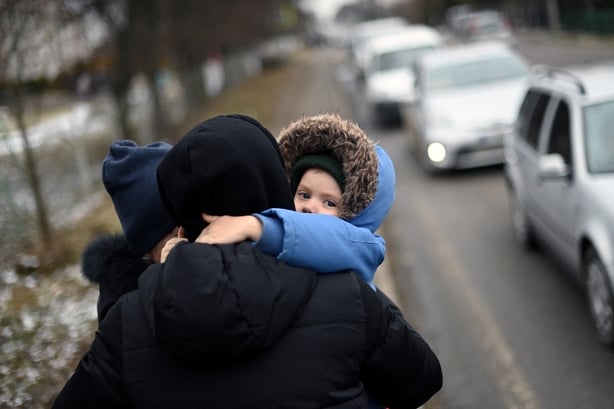Latest from the Hrebenne checkpoint in Poland at 7pm local time.
Beside a beautiful watery vista in spring lies a highway of horror - Ukrainians fleeing the ongoing Russian invasion.
It takes hours to cross the frontier and then the new arrivals spill out by the side of the road.
There are searing images of a population commencing a life of exile, one which often begins with confusion and distress.
This checkpoint, like others, has people also travelling from Poland into Ukraine - some to fight, others to bring aid.
It is not just humanitarian and medical supplies going to the Ukrainian capital Kyiv, it's also protective equipment for those trying to defend the city.
All day the flow of humanity continues and things move quickly here. No sooner have new arrivals crossed the border, then they are on the move again.
There is no time to process what has happened, dealing with the trauma will come later.
Tonight, one piece of good news. Irishman Brendan Murphy crossed into Poland from Ukraine with his wife and family.
He has divided emotions about leaving a destroyed country, but he and his family are now en route to Warsaw.
Breaking - Irishman Brendan Murphy speaks just after crossing over from #Ukraine to #Poland tonight with wife and family @rtenews pic.twitter.com/8OSk7ggni0
— Paul Cunningham (@RTENewsPaulC) March 3, 2022
Update as of 1.20pm local time
I'm looking out at a beautiful scene: Hrebenne lake is dead still, reeds reflected in the sunshine on the water, birds wading along the shoreline.
Framed by gentle, forested hills across the border in Ukraine, it's a postcard-perfect picture.
Except we're in a horrific moment in the history of Ukraine, at a checkpoint where we’re seeing a sea of misery continuing to flow across this border into neighbouring Poland.
Right now, RTÉ cameraman Owen Corcoran and I are filming as yet another group flees Ukraine on foot.
They struggle past carrying bags, wheeling suitcases and piggybacking a young child. Polish border police arrive to help.
Cars continue to flow through this checkpoint, and on the opposite side of the road, there's a parallel flow, back along the main road towards the city of Lviv in western Ukraine.
Some who are travelling east are dressed in combat fatigues and tell us they're "ready to fight".
We have met aid workers and civilians driving convoys of humanitarian and medical aid.
And we’ve watched as a truckload of body-armour, bulletproof vests and helmets, was driven across the border to be distributed among civilians defending their capital, Kyiv.

Hrebenne, once a quiet border-crossing between the EU and Ukraine has become a place of constant motion. And heartbreak.
Those arriving on foot are helped with their luggage and escorted to a reception area.
Here they're given essential supplies for their onward journey: food, toiletries, clothing, toys, and SIM cards for their mobile phones.
Often, this is their top priority - the hope of contacting family or friends elsewhere in Europe who may take them in.
Every half an hour or so a convoy of coaches leaves to take these new and often disorientated refugees to another reception area about 8km away, and from there they are being bussed to towns and villages within Poland or further afield if that's where they want to go. They will have no transport costs.
It is a fairly fast moving operation here, people are not dwelling. In the past seven days Poland has accepted more than 500,000 people crossing from Ukraine. Authorities are expecting several times that number to arrive.
The difference between this checkpoint and Medyka from where we reported yesterday is that here there are no tailbacks.
And it seems to be a better route from Lviv. One man told us he was able to drive the 60km from the city to here in just a few hours.
The speed at which refugees can get through checkpoints varies at each one, depending on the circumstances.
People are arriving exhausted.
Many are making the journey with elderly relatives and young children.
For these people fleeing Ukraine, what they have experienced in the past week has been horrific. And they face uncertainty ahead.
It is gut-wrenching for them to even tell their stories; some can't find the words to articulate what has happened to them.
On several occasions during interviews with us, people began to tell us of their journey to Poland but then veered into staccato descriptions of the flash of the bombs or the sounds of the bullets. Some got halfway through their story and stopped.
At times it feels terrible asking for interviews, and sometimes we’ve stopped filming because of that, as the trauma is clear.
There’s a consistency to the stories. It’s impossible to independently verify what we’re being told here, but we’re travelling along the Ukrainian/Polish border and talking to a lot of people over the past three days and they’re all saying the same thing.
They’ve made their way here from all over Ukraine, including from Kyiv where so many have witnessed live shelling of their capital city.
They’ve left everything behind; their normal lives, their homes, their jobs, and their men. They are fleeing without their fathers, their brothers, their uncles, their sons - because it’s still predominantly women and children crossing into Poland. And they’ve no idea where they're going.







